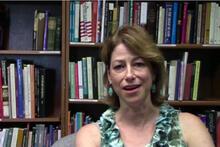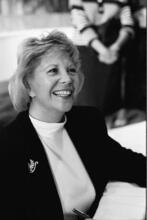Shari Lewis
Shari Lewis won twelve Emmy awards for her children’s programming, which featured puppets on variety shows and children’s shows. Lewis began piano lessons at age two and studied music, dance, and ventriloquism before quitting college to become a performer. In 1952, she won first prize on CBS’s Talent Scouts for her puppetry, and in 1960 she began the Shari Lewis Show, which ran for three years. She then had a series on the BBC that ran for eight years. In 1992, she began Lamb Chop’s Play-Along on PBS, which focused on situations that affect children, such as not being invited to a party. Lewis earned some of the industry’s highest honors, including a Peabody Award and the Kennedy Center’s Award for Excellence.
Shari Lewis was a ventriloquist, symphony conductor, author, producer, and performer. She and her puppet friends won numerous awards. She was asked by former first ladies Nancy Reagan and Rosalyn Carter to be the sole performer at the annual White House Christmas party for the children of the Diplomatic Corps, and she emceed the annual White House Easter festival for the Bushes and the Clintons.
Family and Education
Shari Lewis was born Phyllis Hurwitz to Ann (Ritz) and Abraham Hurwitz on January 17, 1933, in New York City. Abraham Hurwitz was a founding professor at Yeshiva University of New York City. His lifelong specialty was encouraging children in their studies through play, a focus that his daughter continued. Lewis’s mother, a pianist, was one of six music coordinators for the Board of Education for the City of New York. Shari took piano lessons from her mother starting at age two. A first marriage to Stan Lewis ended in divorce. In 1958 she married television producer and publishing executive Jeremy P. Tarcher. They had one daughter, Mallory, a writer of children’s books. Lewis’s imaginative offspring include the hand puppets Lamb Chop, Charlie Horse, and Hush Puppy.
With encouragement from both parents, Lewis began performing at the age of thirteen, when her father taught her magic acts with Jewish content: one candle multiplying to become eight candles to illustrate Lit. "dedication." The 8-day "Festival of Lights" celebrated beginning on the 25th day of the Hebrew month of Kislev to commemorate the victory of the Jews over the Seleucid army in 164 B.C.E., the re-purification of the Temple and the miraculous eight days the Temple candelabrum remained lit from one cruse of undefiled oil which would have been enough to keep it burning for only one day.Hanukkah and a torn newspaper that, when restored, had the design of a Jewish star. As a youth, she had lessons in acrobatics, juggling, piano, violin, and ventriloquism. She took her lessons in ventriloquism from John Cooper, with whom she practiced on a park bench. When she started performing ventriloquism, she added Old Testament tales to her repertoire. She studied piano and violin at New York’s High School of Music and Art, dance at the American School of Ballet, and acting with Sanford Meisner of the Neighborhood Playhouse. She attended Columbia University for one year, then left college to become a performer.
Career
In 1952, Lewis and her puppetry won first prize on Arthur Godfrey’s Talent Scouts television show. In March 1956, she and Lamb Chop appeared on Captain Kangaroo, and by 1960 she had her own television program, with Charlie Horse and Hush Puppy joining the crew. The show ran three years, until animated cartoons replaced live performances.
After 1963, Lewis did television specials, acted in touring companies, and conducted symphony orchestras. She performed and conducted with more than 100 orchestras, including the national symphonies of the United States, Canada, and Japan. She performed in national and summer stock productions of Damn Yankees, Bye Bye Birdie, and Funny Girl.
From 1968 until 1976, Lewis had her own TV series on BBC-1 in England. During that period, she also did television series and specials in Canada and Australia.
After twenty-seven years’ absence from American television, the Public Broadcasting System approached her about reviving her television show. During those twenty-seven years, Lewis says, the nature of children’s television became commercial, and producers focused on age groups for the purpose of marketing products. Lamb Chop’s Play-Along, seen on PBS stations and reproduced in video, grew out of PBS interest and Lewis’s discontent with commercial television.
“The show stresses the joys of diversity,” Lewis said in a New York Times interview, with songs in languages other than English and a trio of on-air children chosen to represent an ethnic mix. The program involved physical involvement on the part of the children and was aimed at an audience from two to ten years old. Children from the television audience joined in the show. Buster the Bus and Lamb Chop’s teddy bear Mr. Bearly debuted during the second PBS season. The shows stressed situations that affect children, such as not being invited to a party or feeling lonely. The shows did not preach; they demonstrated.
Lewis’s productions included the video 101 Things for Kids to Do, One Minute Bedtime Stories with brief versions of traditional tales, and Don’t Wake Your Mom, winner of the 1992 Parent’s Prize. Videos from Lamb Chop’s Play-Along television series include Action Stories in which children can participate by filling in missing words or mimicking sounds, Let’s Make Music, teaching children about music and musical instruments, and Jokes, Riddles, Knock-Knocks and Funny Poems.
In 1993, Lewis also in Congressional hearings on the Children’s Television Act with the help of Lamp Chop in 1993. The video Lamb Chop’s Special Chanukah was released in 1996 and received the Parent’s Choice award of that year.
Accolades and Later Life
Among her awards are twelve Emmy Awards, the Dor L’Dor award of the B’nai B’rith (1996), three Houston Film Festival awards, the Peabody Award (1960), the Silver Circle Award of the National Academy of Television Arts and Sciences (1996), the Film Advisory Board Award of Excellence (1996), two Charleston Film Festival Gold Awards (1995), the Houston World Festival silver and bronze awards (1995), the New York Film and Video Festival Silver Award (1995), the Monte Carlo Prize for the World’s Best Television Variety Show (1963), and the Kennedy Center annual award for excellence (1983).
Shari Lewis died of pneumonia at Cedars-Sinai Hospital in Los Angeles on August 2, 1998.
“At Forty, Lamb Chop Still Plays Along Successfully.” Los Angeles Times, March 16, 1996.
Contemporary Authors. Vol. 19 (1987).
Contemporary Authors. Vols. 89–92.
Contemporary Theatre, Film and Television. Vol. 3 (1986).
“Dishing Up Lamb Chop.” Washington Post, April 4, 1994.
“Forever Young.” Parent’s Magazine, July 1994.
Legends in Their Own Time (1994).
“Lewis, Lamb Chop Now on CD-ROM.” Chicago Tribune, May 6, 1996.
Lewis, Shari. “Conversation.” NYTimes, December 27, 1992.
“Mild and Wooly.” People Magazine, October 19, 1992.
Who’s Who in America.
Who’s Who of American Women.






